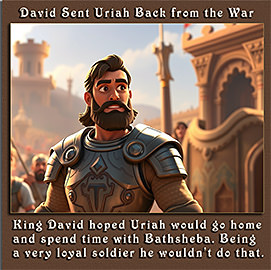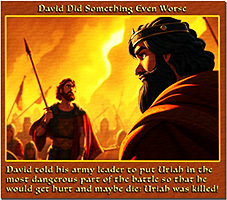2 Samuel 11:1–27 . . . Bible Study Summary with Videos and Questions
“David and Bathsheba”
Chapters 11 through 20 begin the story of failure in David’s life — the black and bitter picture of his sinfulness. The sins that tend to shock us most are the ones committed by those who know better. If anyone were immune to moral failure, you’d think it would be boy-turned-king David, who watched a giant fall at his feet; the one whom God miraculously spared from death and handed a kingdom; the man who wrote dozens of songs about his devotion to God and God’s devotion to him; and the person whom God specifically chose for his loyalty and obedience (1 Samuel 13:14; Psalm 89:20). But even great faith doesn’t inoculate us against temptation.
David’s sin, much like many of ours, began as a slow slide. “In the spring, at the time when kings go off to war” (v. 1a), David was at home instead. Apparently he felt his kingdom was secure enough that his right-hand military-man, Joab, could take care of business on his own. Maybe he suffered from vocational boredom or spiritual apathy. Maybe he had a mid-life crisis or was just feeling lazy. But that’s when temptation came, then justification, then sinful trespass.
[Note: Click the link to This Week’s Passage near the bottom of this page to read today’s Scripture.]
David’s Adultery with Bathsheba (2 Samuel 11:1–5)
a·dul·ter·y /əˈdəlt(ə)rē/ noun
voluntary sexual intercourse between a married person and someone other than that person’s current spouse or partner (Merriam-Webster)
In that part of the world, wars weren’t usually fought during winter months because rains and cold weather made travel and campaigning difficult; fighting resumed in the spring. While Joab and his army went off to complete their battle with the Ammonites the following spring by besieging “Rabbah,” the capital of Jordan, David resided in Jerusalem (v. 1). By mentioning the fact that kings normally led their armies into battle in the spring, the author implied that David wasn’t acting responsibly by staying in Jerusalem. Leading his troops into battle was expected to be the major output effort of an ancient Near-Eastern ruler. David’s decision to stay at home in Jerusalem, rather than fighting the Ammonites with his army, became a devastating one. He didn’t stay home to meditate on the Law of Moses or to write a psalm or two; he seems to have simply stayed home. We know that Uriah, Bathsheba’s husband and an army commander, went to bed when evening became dark; it’s likely that he got up at first light (see v. 13). With David, it was very different. He didn’t get up until evening, when it was time for a soldier to go to bed. It’s very unlikely that David was doing any “kingly work” during the wee hours of the night. From all appearances, David was simply indulging himself.
… Boy-Turned-King David Was Entranced!

Click to enlarge Warren Camp’s
Scripture picture of “2 Samuel 11:2 NCV.”
It was springtime when David encountered temptation. He couldn’t stay in his bed any longer. Getting up, he strolled around his palace roof. Suddenly his eyes saw something that riveted his attention: a woman bathing herself within sight of his penthouse rooftop. His sin act wasn’t in seeing Bathsheba; it was unlikely that he expected or planned to see her; his offense was choosing to focus on an alluring image. Christians — men, especially — must learn to never let their eyes/mind rest on alluring images (outside of marriage).
Most certainly, the king’s palace was built on the highest ground possible, affording him a commanding view of the city and its surrounding country. Virtually every other residence and building in Jerusalem would have been below his penthouse apartment; thus he’d be able to see much that was out of sight for others. Seeing the woman, he didn’t know who she was or if she was married. He was entranced. It wasn’t necessarily evil for him to discretely inquire about her. If she were unmarried and eligible, he could have taken her for his wife. His inquiry would make this clear.
Our most-difficult times don’t happen when things are challenging, because hard times create dependent people; survival keeps you humble. Pride happens when everything is swinging comfortably in your direction. When you’re growing in prestige, fame, and significance, that’s the time to watch out, especially if you’re unaccountable. Our greatest battles don’t usually happen when we’re working hard; they come during leisure, when we’ve got time on our hands, when we’re bored. David’s temptation followed an age-old pattern: he saw, he desired, he took. He couldn’t help seeing Bathsheba. But he could have stopped watching, lusting, sending for her, and lying with her. The “very beautiful” in v. 2 translates a Hebrew phrase that describes people of striking physical appearance. Perhaps Bathsheba wasn’t totally innocent, but that doesn’t exonerate David’s guilt. It seems reasonable to assume that she could have shielded herself from view if she’d wanted to do so. Yet the author never explicitly blamed Bathsheba for what happened, only David.
Word came back to David about this woman’s identity (v. 3b). He learned that the woman came from a notable, upper-class family. Her father was Eliam, one of David’s thirty-seven “mighty warriors” (2 Sam. 23:34) and her grandfather was Ahithophel, one of David’s chief counselors (15:12). David was also told that Bathsheba was married to another of his mighty men (23:8, 39). He also learned that this woman’s husband was away, because the mighty men were out battling the Ammonites. Such knowledge made the situation far more tempting. David probably thought, I could get away with this.
Such information should have been sufficient for him to immediately end the matter. If this woman was married, he had no business going any further. No matter how great his position and power, nothing allowed him to take another man’s wife. He also learned that Bathsheba was married to Uriah the Hittite who wasn’t a nameless husband, someone David had never known. David had to have known Uriah, even if he didn’t know his wife. In 23:39, “Uriah the Hittite” is named as one of David’s mighty men, known for his bravery and courage as an army captain. If David didn’t know that outright, surely someone among his servants would have informed him that Bathsheba’s husband was Uriah.
Though he was a Hittite by race, Uriah had a good Hebrew name meaning “Yahweh is my light.” He might have been a mercenary from one of the Syrian or Hittite states to Israel’s north. David, who was close to 49 years old when he committed adultery, then “slept with” or “took” Bathsheba — the Hebrew wording means “collected” her — and so abused his royal power. Evidently this was a “one-night stand”; David and Bathsheba appear to have had sex only on this one occasion before their marriage. In the Hebrew text, it’s clear that Bathsheba “purified herself” before having sex with David. The Hebrew clause suggests: Now at that time she had purified herself from her [menstrual] uncleanness. So, having just completed her menstrual cycle, and having purified herself from the ritual uncleanness that menstruation caused (cf. Leviticus 12:2; 15:19; 18:19), Bathsheba would have been physically ready to conceive. Thus Uriah, who was away at war, couldn’t have been the father of the child she conceived.
David embraced the temptation. He sent messengers to Bathsheba (v. 4) who brought her to him. In the expression “to get her, and she came to him,” there’s no intimation whatever that David brought Bathsheba into his palace through craft or force. Rather, she came at his request, without any hesitation, offering no reluctance or resistance to his desires. Consequently, Bathsheba isn’t to be regarded as free from blame. Neither is there evidence that she was taken forcefully.
King David slept with her. When she became purified from her uncleanness, she returned to her house. That was it. The phrase in v. 4 confirms that Bathsheba had recently had her menstrual period and wasn’t already pregnant when David committed adultery with her. If she hadn’t become pregnant, she probably wouldn’t have returned to him. David hadn’t wanted Bathsheba as a wife; he wanted one night of sex with a very beautiful woman before he’d let Uriah have her forever.
Bathsheba’s only recorded message to David, brief though it is, “I am pregnant” (v. 5), sets in motion a course of action that ultimately resulted in her husband’s death. You might wonder: Why did Bathsheba inform only David that she was pregnant? Couldn’t she have waited and then told her husband when he returned from battle? Was she hoping that David would acknowledge her child so that it would then enjoy royal privileges? The author leaves us guessing.
Note: This king who took another man’s wife already had a harem full of women. It’s a simple fact: The passion of sex isn’t satisfied by a full harem of women; it’s increased. Having many women doesn’t reduce a man’s hearty libido, it excites it … it stimulates it.
David’s Attempts to Conceal His Sin (vv. 6–13)
David felt that he had to cover up his sin, for Bathsheba’s sake as well as his own. His Plan A was to have Uriah come home, sleep with his wife, and then. . . nine months later, realize that he’d become a father. He and his wife would be happy while David would have complete deniability. No one could prove anything.
Note: David wasn’t really in danger. Although the penalty for adultery was death (Lev. 20:10; Deuteronomy 22:22), no court in Israel had authority to convict a king of adultery. And David would surely intervene to protect Bathsheba from being convicted. But that would be messy; it would hurt Bathsheba’s marriage and sully the king’s reputation as a righteous follower of Yahweh.
So David sent for Uriah, who returned, approximately 40 miles from the siege of Rabbah, to Jerusalem. When he arrived, David asked him general questions about how the siege was going (v. 7). This was David’s awkward attempt to pretend that nothing had happened. He gave every appearance that things were normal when, in God’s sight, nothing about David was normal or right. He then encouraged Uriah, “Go down to your house and wash your feet” (v. 8). In other words, King David was encouraging Uriah to go home, relax with his wife, wash and refresh himself — then have sex!
David’s problem was that Uriah didn’t go home. Rather, he slept in the guardhouse of David’s palace. When David was informed of this, he summoned Uriah who explains in v. 11 that, because he was an honorable man, he didn’t feel it appropriate for him to relax at home and lie with his wife while his fellow soldiers endured the rigors of war “in the open country.” David had expected and hoped that Uriah would prove to be like himself; instead he proved to be a man of integrity whose first loyalty was to the king’s interests, rather than to his own pleasure. But David wouldn’t give up. Plan B: So he detained him another night and got him drunk. He hoped that by getting Uriah drunk, he wouldn’t be so quick to identify with his fellow troops’ challenges. But again David underestimated Uriah. David was drunk with lust when he slept with Bathsheba; he hoped that getting Uriah drunk with wine would bring the same result. Nevertheless, Uriah didn’t go to his house. He refused to enjoy what his fellow soldiers couldn’t, during their raging battle. He wouldn’t go home to sleep with Bathsheba.
David Orchestrates Uriah’s Killing (vv. 14–27)
David’s brazen rebellion against God’s will comes out clearly in his third plan. With Plans A and B being unsuccessful, David conceived of Plan C. Having failed to cover his sin, David wanted Uriah dead. He’d write a letter to Joab (vv. 14–15) that was to be delivered by Uriah. It ordered Joab to put Uriah on the front line of battle where the fighting was the fiercest, then withdraw from him so he’d be struck down and killed by the Ammonites. David sealed the letter so it couldn’t be opened by Uriah, sending Uriah back, carrying his own death warrant, giving it to Joab who complied with the king’s order that commanded Joab to arrange for Uriah’s death.
Other innocent soldiers, besides Uriah, died because of David’s orders concerning this battle strategy (v. 24). David was fully responsible for their deaths. Uriah was killed in battle, just as surely as if David murdered him in his own home. And Joab did exactly what David had commanded; he most likely knew it was wrong to follow David’s command to have Uriah placed in a position to be killed in battle, but he complied with the order and became complicit in the act, even if he didn’t openly resist or question it.
However, Joab didn’t follow David’s orders exactly. David had told Joab to have Uriah killed by withdrawing soldiers from around him, leaving him to face the enemy alone (v. 15). Perhaps Joab felt that that would document an obvious betrayal, which would be difficult to explain to other army officers. Instead, he devised a plan to have the soldiers fight near the wall. Sadly, that maneuver endangered more soldiers and resulted in greater loss of life. That’s probably why Joab prepared his messenger for David’s strong reaction to the news of Uriah’s death the way he did in vv. 19–21.
Joab sent word of Uriah’s death back to David who heard with relief the words, “moreover, Uriah the Hittite died.” He thought: Now I can marry Bathsheba and give a plausible explanation for her pregnancy. So he married Bathsheba. We have no reason to believe that she knew that David arranged her husband’s death. It’s likely that David concealed that from Bathsheba. At the same time, she was partly relieved to hear of her husband’s death, considering her danger of being stoned to death as an adulteress. She also possibly hoped that she’d now be made a queen.
David, in retrospect David might have been something of a hero then, in the eyes of his people. He’d taken into his harem a poor, pregnant wife, the widow of one of his fallen captains. The people might have said: My, look at the way he stands behind his men! He takes care of their widows when they’re killed in battle. What a marvelous king we have! But his actions were seen as an abuse of power that displeased God.
David compounded his sin by trying to cover it up rather than confessing it immediately, which led to even graver consequences. His three cover-ups: a “clean” one (vv. 6–11), a “dirty” one (vv. 12–13), and a “criminal” one (vv. 14–17).
However, palace gossip was surely told, embellishing the true story so that the king’s sordid acts became widely known (2 Sam. 12:14). Certainly, David’s palace servants would have known that the child was his, since, even back then, people could count as high as nine (11:27). David married Bathsheba after a period of mourning; she became part of his harem. Everything seemingly settled down and the baby was born.
But the thing David had done displeased the Lord (2 Sam. 11:27b).
At the end of the chapter’s closing verse, we read the first mention of God. The LORD witnessed every event and read the intent of every heart, but His displeasure is only implied within this specific statement.
David, who’d somehow avoided bloodguilt by God’s grace up until now, became covered with Uriah’s blood!
† Summary of 2 Samuel 11:1–27
2 Samuel 11:1–27 narrates a pivotal and tragic episode in King David’s reign marked by moral failure. The chapter opens with David remaining in Jerusalem while his army fights, breaking the expected kingly role to lead in battle (11:1). From his rooftop, David sees Bathsheba, the wife of Uriah the Hittite, bathing and is overcome by desire (vv. 2–3). He summons her, sleeps with her, and she conceives (vv. 4–5). To conceal the pregnancy, David orchestrates a plan to bring Uriah home from battle, hoping Uriah will sleep with Bathsheba and believe the child is his (vv. 6–13). However, Uriah refuses to enjoy comfort while his comrades are fighting, demonstrating his loyalty and integrity (vv. 11–13). David’s plan then darkens as he sends Uriah back to battle with orders for Joab to place him where the fighting is fiercest, ensuring Uriah’s death (vv. 14–17).
After Uriah is killed, David takes Bathsheba as his wife, and she bears him a son (vv. 26). Despite his cover-up, the chapter ends by stating explicitly that “the thing that David had done displeased the Lord” (v.27). This passage highlights David’s misuse of royal power, moral failure through adultery and murder, and attempts at deception. It sets the stage for subsequent divine judgment and repentance. The narrative warns about the dangers of complacency, lust, and abuse of power. It underlines that even a man after God’s own heart can fall grievously and will face consequences.
Key points with verse references:
• David stays behind in Jerusalem instead of leading his army to battle (v. 1).
• David sees Bathsheba bathing, desires her, and sleeps with her, leading to pregnancy (vv. 2–5).
• David tries to cover his sin by bringing Uriah home, but Uriah refuses to lie with his wife while his comrades are fighting (vv. 6–13).
• David orders Uriah’s death in battle through Joab’s strategy (vv. 14–17).
• After Uriah’s death, David marries Bathsheba, but the Lord is displeased with David’s actions (vv. 26–27).
This Week’s Passage
2 Samuel 11:1–27
New International Version (NIV) [View it in a different version by clicking here; also listen to chapter 11 narrated by Max McLean.]
Summary Video: “The Second Book of Samuel”
† Watch this introductory video clip created by BibleProject on bibleproject.com.
- Q. 1 How can a “man after God’s own heart” do something so ugly, so despicable as this — first adultery, then murder by proxy to cover it up?
- Q. 2 What does this passage teach you about your human condition?
- Q. 3 What’s needed for David to recover his integrity after this?






